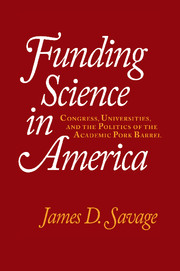Book contents
- Frontmatter
- Contents
- List of Tables and Illustrations
- Preface
- 1 The Politics of Academic Earmarking
- 2 The Incentives to Earmark
- 3 AAU and the Fight against Earmarking
- 4 The Struggle to Fund Academic Research Facilities
- 5 Lobbyists, Lobbying, and the Pursuit of Academic Earmarks
- 6 Congress and the Distribution of Academic Earmarks
- 7 Congress, the President, and the Fight against Earmarking
- 8 The Future of Academic Earmarking
- Select Bibliography
- Index
1 - The Politics of Academic Earmarking
Published online by Cambridge University Press: 19 January 2010
- Frontmatter
- Contents
- List of Tables and Illustrations
- Preface
- 1 The Politics of Academic Earmarking
- 2 The Incentives to Earmark
- 3 AAU and the Fight against Earmarking
- 4 The Struggle to Fund Academic Research Facilities
- 5 Lobbyists, Lobbying, and the Pursuit of Academic Earmarks
- 6 Congress and the Distribution of Academic Earmarks
- 7 Congress, the President, and the Fight against Earmarking
- 8 The Future of Academic Earmarking
- Select Bibliography
- Index
Summary
In 1983, Michael Sovern, president of Columbia University, and William Byron, president of the Catholic University of America, independently reached the same conclusion: to finance the construction of new research facilities on their campuses, they would use their institutions' political influence in Congress to obtain federal appropriations. At first glance, there appeared nothing unusual about university presidents seeking to expand their institutions' research capabilities or about the federal government's financing such facilities. Extensive federal facilities funding had, after all, taken place during the late 1960s. What mattered was that Sovern and Byron secured the $5 million for Columbia and the $5 million for Catholic by obtaining earmarks in federal legislation. By doing so, they created one of the most divisive issues to confront the higher education research community in the 1980s and 1990s: whether colleges and universities should seek earmarked – or pork barreled – federal funds for academic research and facilities projects.
In response to Columbia and Catholic, many of the most powerful higher education lobbies and prestigious scientific societies passed resolutions denouncing academic earmarking. University presidents cajoled each other in public and private forums to refrain from this practice. Major scientific magazines, such as Science, Physics Today, and Chemical and Engineering News, began regular coverage of earmarking and published editorials attacking the practice. The Chronicle of Higher Education initiated its annual listing of earmarking schools. Watchdog groups such as Citizens Against Government Waste targeted academic earmarks in their newsletters and television programs.
- Type
- Chapter
- Information
- Funding Science in AmericaCongress, Universities, and the Politics of the Academic Pork Barrel, pp. 1 - 18Publisher: Cambridge University PressPrint publication year: 1999

